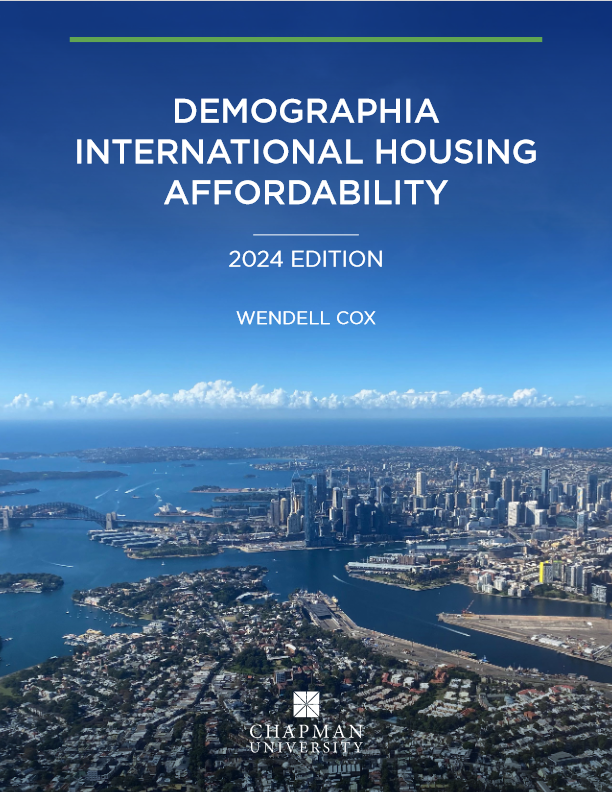FOR IMMEDIATE RELEASE
2024 Demographia International Housing Affordability Report Highlights Global Housing
WINNIPEG, June 3 2024: The latest Demographia International Housing Affordability Report has been released, providing a comprehensive assessment of housing affordability across 94 major markets in eight countries: Australia, Canada, China, Ireland, New Zealand, Singapore, the United Kingdom, and the United States. The 2024 report, released in co-operation with the Frontier Centre for Public Policy, is based on data from the third quarter of the year, reveals a growing disparity in housing affordability.
The affordability index calculates the ease or difficulty with which people can buy homes in different places. It uses a measure called the Median Multiple, which contrasts the average house price to the average household income. The lower the number of income years it takes for a household with an average income to pay for an average-priced home, the more affordable the area is. The index gives different ratings for different ranges of the Median Multiple. This helps compare how easy it is to buy a home in different cities.
Key Findings
Affordability Ratings: The report employs a median price-to-income ratio, known as the “median multiple,” to evaluate housing affordability. Markets are categorized from “affordable” to “impossibly unaffordable.”
Geographic Comparisons: Housing affordability is assessed across labor markets, defined by commuting areas. Comparisons can be made between different markets, such as Adelaide and Melbourne, or within the same market over time.
National Variations: Significant differences in affordability are observed within nations, underscoring that national averages do not always reflect local realities.
Affordability by Nation:
Australia: No markets are affordable, with five markets classified as severely or impossibly unaffordable.
Canada: Six markets, with Vancouver being notably unaffordable with a median multiple of 12.3.
China (Hong Kong): Hong Kong is the least affordable market with a median multiple of 16.7.
Ireland: One market categorized as seriously unaffordable.
New Zealand: One market, with Auckland significantly unaffordable.
Singapore: Moderately unaffordable with a median multiple of 3.8.
United Kingdom: A mix of affordability, with 23 markets rated, none of which are affordable.
United States: The most diverse range, with 56 markets assessed; Pittsburgh (PA) is the most affordable with a median multiple of 3.1.
Top and Bottom Markets:
Most Affordable: Pittsburgh (PA), Rochester (NY), St. Louis (MO-IL), and Cleveland (OH) lead with median multiples ranging from 3.1 to 3.5. Other affordable markets include Edmonton, Buffalo (NY), and Detroit (MI).
Least Affordable: Hong Kong, Sydney, Vancouver, San Jose (CA), and Los Angeles (CA) are among the least affordable, with median multiples exceeding 10.
The Housing Affordability Crisis: The report identifies a significant housing affordability crisis impacting the middle class, driven by escalating housing costs that outpace income growth. This is largely attributed to land use policies that restrict housing supply, leading to higher land prices and reduced affordability.
Unban Containment Policies: Policies aimed at limiting urban sprawl and increasing density, such as greenbelts and urban growth boundaries, have inadvertently constrained land availability, causing dramatic increases in housing prices within these boundaries.
New Zealand Reforms: New Zealand is highlighted as a model for addressing this crisis. Proposed policies encourage housing development beyond urban peripheries where land prices are lower, thereby enhancing affordability.
A Call to Prioritize People: The report emphasizes the need to prioritize individual well-being over rigid planning doctrines. By focusing on economic opportunities and the needs of middle- and lower-income households, a more balanced approach to urban planning can be achieved.
For more information:
Contact:
Wendell Cox
Demographia
demographia@gmail.com
Marco Navarro-Genie
Director of Research
Frontier Centre for Public Policy
mng@fcpp.org
1 (403) 818-7148
About Demographia
Demographia is dedicated to providing reliable data and analysis on housing affordability across the globe. Through its annual reports, Demographia aims to highlight critical issues affecting housing markets and inform policy decisions.
About the Frontier Centre for Public Policy
The Frontier Centre for Public Policy is an independent, non-partisan think tank that conducts research and analysis on a wide range of public policy issues. Committed to promoting economic freedom, individual liberty, and responsible governance, the Centre aims to contribute to informed public debates and shape effective policies that benefit Canadians.



